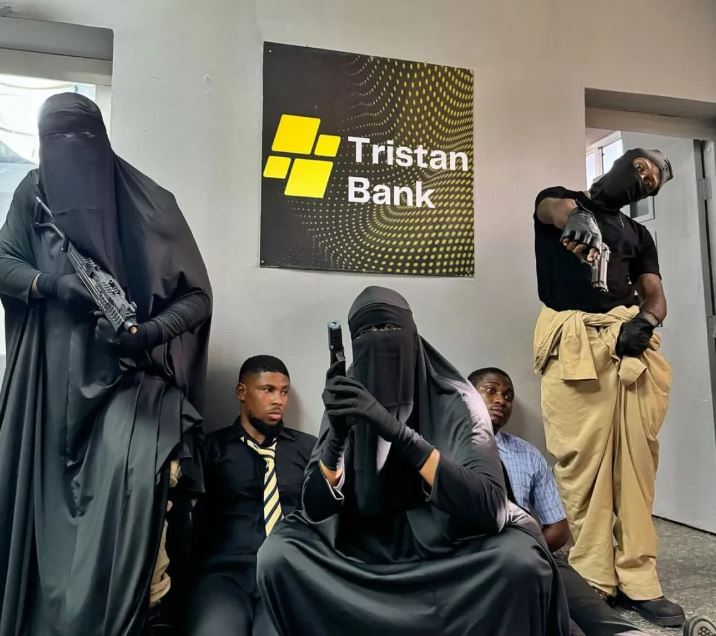Nollywood actress Nancy Isime has ignited outrage among the Nigerian Muslim community for wearing a niqab in a robbery scene in the upcoming movie, “Three Working Days.”
On Monday, Isime posted pictures on Instagram of a bank heist scene from the movie, dressed in Muslim attire, with the caption “Life Lately.”
The images show her in a niqab, holding guns in what appears to be a bank robbery. Directed by Jerry Ossas, the movie features Demi Adebayo, Mike Afolarin, Uzor Arukwe, Deyemi Okanlawon, Romeo Horsfall, and Emem Ufot.
The movie’s poster, also shared in her post, shows women in hijabs and face veils brandishing guns during a bank heist, which has sparked widespread outrage.

In July 2023, a similar controversy arose when the first 45 seconds of ‘Jaye Lo’, a music video by Davido signee Logos Olori, showed men in white attire (Jalabiyas) and white caps dancing in front of a mosque. This led to significant backlash from the Muslim community, resulting in Davido pulling the video from release.
Critics argue that Isime’s movie depicts Muslim women as criminals and incites public hostility against them.
Ishaq Akintola, the executive director of MURIC, issued a press statement on Thursday urging the National Film and Video Censors Board (NFVCB) to take action against the film. He described the movie as “satanic, repugnant, and provocative,” warning that it could incite hostility towards Muslim women and ridicule the Muslim community.
“This film is Islamophobia taken to the highest level,” Akintola stated. “It aims to portray Muslim women as criminals, potentially inciting violence and discrimination against them.”
MURIC argues that such portrayals are part of a broader plot against Muslim practices and could fuel tensions within the country. Akintola suggested that the film was crafted by those opposed to Muslim customs, aiming to deter Muslim women from wearing hijab and niqab. He called on the NFVCB to investigate and immediately ban the film.
In the meantime, MURIC has urged the Muslim community to remain calm and peaceful.
As the controversy unfolds, all eyes are on the NFVCB to see how it will respond to MURIC’s demands.
Additionally, an online petition on change.org titled “Mockery and Defaming of Muslim Women,” initiated by Maryam Hanbali, is calling for the movie’s ban.
The petition, which has already garnered over 23,670 signatures, demands the immediate withdrawal of the movie from all platforms and seeks a public apology from the producers and Ms. Isime.
Bashir Ahmad, former Digital Communications Assistant to President Muhammadu Buhari, criticized the movie on X (formerly Twitter).
He suggested that the producers should have considered alternative costumes, such as balaclavas or masks, instead of using religious attire for criminal portrayal. He emphasized that for Muslims, the hijab (niqab) is a symbol of respect and adherence to religious teachings, not a tool for hiding identities to commit crimes.





